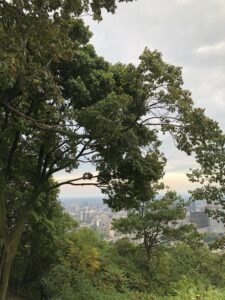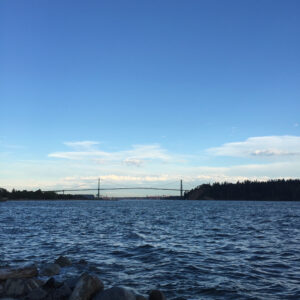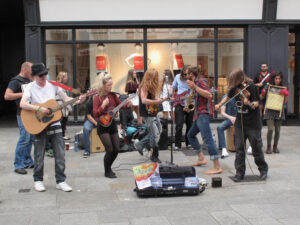Arts and Culture
Fragments of a Whole Being Belonging
I belong to Air Canada.
In this moment. January 2020.
Buckled into Seat 14C.
Far above where birds take flight. The place where dreams alone can live.
In this moment, I belong to this unbounded world above the clouds. A creature of the air.
This air-borne liberation is a mirage.
I know my feet belong on the ground. A creature of the earth.
I am on a flight to Montreal to visit friends. Their relocation to this city will bring me back again and again because our friendship is long standing and we will nurture it. My friends have also made me belong to Montreal again.

Again, because this is the city where my parents met. Where I was born, but never lived in for long. What part of me, then, belongs here? Belongs to this city where I speak the language only to a moderate level of fluency? Because all of me would not be if it weren’t for this city.
But countries and cities pull at me from all different directions.
Jamaica – my mother’s birthplace. Lebanon – my father’s. Kuwait – where my sister was born. Calgary – where my youngest sister was born. And Vancouver where we settled in 1974 and where my family has stayed since. All of us have ventured afar over the years, whether alone or together, to travel or to live for fragments of time. Toronto – where I lived for six years.
My whole being is a mosaic of spaces, places, and time. Of different cultures and societies. I identify with all of them and I identify with none of them. I am rooted in my experiences with each and am unrooted because I do not feel like I wholly belong in any of them.
They have all shaped me as have other cities I’ve visited, especially those that feel as if they are the locations where I ought to be, where I yearn to be.
In Montreal, my friends and I go to a movie they want to share with me. Their second viewing, my first.
Antigone (in French, Canada, 2019). Sophie Deraspe’s screenplay and her direction. Based on the Ancient Greek play by Sophocles. A play I know. A play that belongs to me because I have studied it, absorbed it, discussed it, taught it, remember it.
This film, this Antigone, which now belongs to me, too, tells the story of an immigrant family to Canada. Two girls, two boys, and a Grandmother, haunted by the memories of the children’s parents murdered in Algeria, in the country that they once belonged to.
In this country, this foreign Canada, do they belong?

Ismène, the older girl, has built a successful career as a hair stylist. The grandmother cooks, cleans, loves each child ferociously. Antigone is fearlessly devoted to the family, to their story, to their truth. In an address to her class, “une exposition,” she elevates her classmates from a state of boredom, heads on the desk, eyes rolling, to whip-straight postures, eyes that pierce through teenage school inertia. Her story of survival, loss, and grief lures them to listen.
Antigone’s two brothers? Étéocle and Polynice? The fierce family love envelops the two brothers and yet they search for belonging elsewhere.
Why isn’t their family enough?
And why do men so often find belonging in violence, especially vulnerable men?
The story of this dislocated, relocated family unravels in flashbacks and in real time. Antigone’s knowledge of her brothers, the appearance of their being and belonging, is contradicted by the reality she grasps in hindsight.
She remembers a night. Polynice creeps home late, after dark. He opens the fridge door, she startles him in the kitchen. He stands in the shadows, the pale light casting an eerie halo around him. Bruised, bloodied, black-eyed, he exults to his sister “I’m in,” “I’m in.”
In what? In toxic brotherhood? In a position to provide for his family now? In hopelessness? In power? In control, as illusory as that power and control may be?
Polynice is not a lone wolf. What he decides matters. It affects him, his brother, his sisters, his grandmother, his community. But he makes choices as if he were alone. Is his choice a resistance to belonging to this family or is it his way to belong more meaningfully?
His choice is made as if he were an island. But no person is an island.
As much as we may long for separation, for isolation. Long to escape duties, obligations, chores, stress, news, disasters, worries, fears. But a hermetic existence is possible for only a few, it is life’s answer or life’s purpose for even fewer.
Most of us, the vast majority, need – crave – connection. We are social creatures. Socialized creatures. We achieve our potential by being a part of a world wide web and I do not mean losing ourselves in the emptiness of cyberspace or discarding hours of our life on the internet.
We want to belong. We are part of a world of belonging.
We recognize that we are as others are. Lost, found, lonely, together, alive, dying, needy, giving, angry, happy, sad, joyful, cruel, kind, hateful, loving, powerful, powerless, smart, stupid, healthy, sick, caring, selfish, playful, serious, studious, ignorant, ambitious, lackadaisical, safe, unsafe, privileged, oppressed, worried, carefree, careful, careless, faithful, faithless, believing, unbelieving. Free, not free.
Isolation, being alone, is a desire, a fantasy, as is belonging. The former is a choice, the latter inescapable. We are compelled into connection. We are born into a web of connections.
We have to negotiate with ourselves as much as with others. We negotiate with life, with experiences. And despite this we are often unprepared for what life throws at us.
Perhaps there is a toxic underpinning to the idea of belonging. After all, embedded in the word “belong” is the idea of ownership. My husband, my wife, my spouse, my daughter, my son, my child, my father, my mother, my parents, my sister, my brother, my siblings, my niece, my nephew, my uncle, my aunt, my grandparents, my cousins, my relatives, my friend, my colleague, my acquaintance, my pet, my community, my neighbourhood, my job, my school, my work, my career, my money, my dreams, my aspirations, my humour, my loss, my grief, my beliefs, my body, my pain.
Would we be better served by leaving belonging to refer to objects? When we talk about humans, living creatures, plants, trees, the earth and the webs of existence in which we’re enmeshed, would it be better use other verbs: “connect,” “embrace,” “cherish,” “know,” “love”? I connect with this city; this city connects with me. This family embraces me; I embrace this family. These friends cherish me; I cherish these friends. I know that person; that person knows me. You love me; I love you.

Words alone will not remake belonging. We need to excavate the purpose, the meaning, the appeal, the allure, the temptation of belonging.
Why do we care about belonging? Why do we need to belong?
Where do we belong? To whom do we belong?
Where do I belong? To whom do I belong? Who belongs with me, to me?
I think we can only remake belonging if we learn to transcend the boundaries of belonging and not belonging. To embrace the ambiguity and uncertainty of embodying different states and ways of being. To be unbounded. To imagine our lives as bigger than what we can see, hear, touch, taste, and smell. Bigger than our dreams, bigger than our imaginations.
Bigger than our communities of “same as me.”
As big as our hearts.
Because we belong nowhere and everywhere.
I belong nowhere and everywhere.
I may live in Vancouver, but fragments of me are dispersed. Unless I identify with everywhere, I can’t care about the world, the environment, the fragile state of humanity’s existence.
We belong to nothing and everything.
I belong to nothing and everything.
Because I am not beholden or enthralled by a particular thing or person and yet I am curious about all the world has to offer.
We belong to no one and everyone.
I belong to no one and everyone.
Because I am not an object to be owned and yet I am human as you are human, as he is human, as she is human, as they are human, as the many are human.
This heart belongs to those I love, but not as a thing for them to own.
It is a gift that says they are valued and valuable.
This soul is untethered in a state of un-belonging.
The essence of me is free.
Elevate Humanity: Support The Arts!
“Squeeee!”
That was my reaction when Julie Nesrallah, the host of Tempo on CBC Radio, said she was about to play Rimsky-Korsakov’s “Scheherazade”.
Scheherazade is one of my favourite pieces of classical music. When it plays, I soar. I am lifted out of myself to float along currents of enchantment.
When I’m driving, as is often the case when I listen to Tempo, this is problematic. My foot tends to press down on the gas pedal the more immersed I become in the music!
This transcendence, this plug-in to bliss, emphasizes the power of art to shape, teach, transform, heal, and comfort. These attributes are what we need more than ever as we all struggle to grapple with the consequences of the global pandemic.

Galway Street Club, Dublin, Ireland, 2016
Our focus as individuals, families, and communities is on surviving. The focus of governments is on managing health systems and restoring economies. However, to ensure the well-being of society and the well-being of each of us, we need to support creative expression. We need to ensure that the arts thrive.
Unfortunately, arts and culture seldom register as a voting issue during election campaigns, such as the one currently underway in British Columbia. When cast alongside health, housing, and jobs, arts and culture drop down the list of priorities as seemingly, relatively trivial.
I understand why that happens and yet I feel the tendency to do so is misguided. Embedding art in all that we do enriches our experiences, enhances our daily lives, and elevates our humanity. As such, it’s critical that we push our political parties to include support for the arts in their platforms and our elected officials to invest in the arts, especially to facilitate the inclusion of the arts in education, in schools and in the curriculum.
To win the argument for the importance of the arts, professional performance arts organizations often deploy and rely on economic arguments to secure sponsorships and donations. It is true that arts organizations function as economic engines. They employ a wide array of people and generate spending in a number of business sectors. As such, this is an important argument to make especially in a world that justifies investments by returns in dollars and cents. In our current times though the pandemic mitigates the effectiveness of such arguments. We need to emphasize, as we always should do, that investing in the arts is about more than the bottom line of tangible, monetary effects.
It is important to note that arguing for government support of the arts is not the same as advocating for state-sponsored culture. The latter is about nourishing the arts and the latter is about promulgating propaganda. That is why support of the arts should not be contingent on government funding alone. The arts will only survive with individual and community support. We each carry a measure of personal responsibility to ensure that artists and arts organizations have the space, time, and resources to flourish and create.
I also believe that the definition of what constitutes art must be inclusive, expansive, and generous. It is not about creating hierarchical preferences for one art form or the other or privileging the art of certain groups and a few voices. For example, people tend to label opera as elitist and yet opera, fundamentally, is about the human voice and the power of the voice does not depend on costumes, sets, and large venues. Some of the most profound experiences I have had with opera have been in intimate gatherings with no staging to distract from the singer’s voice.
Opera is not an elite art form. It is typically available to only a few because professional opera productions are expensive to stage. That is why the survival of opera as an art form in its professional incarnation depends on government, corporate, and individual support. More importantly, it is crucial for opera companies to invite audiences in with programmes that enhance affordability and to venture out to meet audiences with community-based initiatives.
Support for the arts is about elevating horizons and expanding visions. Art in all its forms should never be a privilege which only a few enjoy and it should never be seen as a talent which only a few can exercise. Creative expression is in all of us and it is for all of us. It is a bridge to building community and understanding. It is a celebration of diversity. It is a path to better.
Art is what makes our spirits soar and our hearts sing.
It makes us more than.
Support the arts in these bleak times. Financially if and when you are able to, with your time and attention if you cannot, because that song, that book, that drawing, that moment of creativity captured in whichever art form you enjoy is a spark of hope.